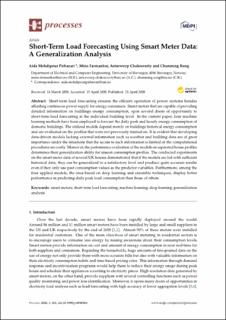| dc.contributor.author | Mehdipourpirbazari, Aida | |
| dc.contributor.author | Farmanbar, Mina | |
| dc.contributor.author | Chakravorty, Antorweep | |
| dc.contributor.author | Chunming, Rong | |
| dc.date.accessioned | 2021-05-10T08:30:59Z | |
| dc.date.available | 2021-05-10T08:30:59Z | |
| dc.date.created | 2020-04-22T14:54:22Z | |
| dc.date.issued | 2020-04 | |
| dc.identifier.citation | Mehdipour Pirbazari, A., Farmanbar, M., Chakravorty, A., & Rong, C. (2020). Short-Term Load Forecasting Using Smart Meter Data: A Generalization Analysis. Processes, 8(4), 484. | en_US |
| dc.identifier.issn | 2227-9717 | |
| dc.identifier.uri | https://hdl.handle.net/11250/2754534 | |
| dc.description.abstract | Short-term load forecasting ensures the efficient operation of power systems besides affording continuous power supply for energy consumers. Smart meters that are capable of providing detailed information on buildings energy consumption, open several doors of opportunity to short-term load forecasting at the individual building level. In the current paper, four machine learning methods have been employed to forecast the daily peak and hourly energy consumption of domestic buildings. The utilized models depend merely on buildings historical energy consumption and are evaluated on the profiles that were not previously trained on. It is evident that developing data-driven models lacking external information such as weather and building data are of great importance under the situations that the access to such information is limited or the computational procedures are costly. Moreover, the performance evaluation of the models on separated house profiles determines their generalization ability for unseen consumption profiles. The conducted experiments on the smart meter data of several UK houses demonstrated that if the models are fed with sufficient historical data, they can be generalized to a satisfactory level and produce quite accurate results even if they only use past consumption values as the predictor variables. Furthermore, among the four applied models, the ones based on deep learning and ensemble techniques, display better performance in predicting daily peak load consumption than those of others. | en_US |
| dc.language.iso | eng | en_US |
| dc.publisher | MDPI | en_US |
| dc.rights | Navngivelse 4.0 Internasjonal | * |
| dc.rights.uri | http://creativecommons.org/licenses/by/4.0/deed.no | * |
| dc.subject | maskinlæring | en_US |
| dc.subject | smartmålere | en_US |
| dc.title | Short-Term Load Forecasting Using Smart Meter Data: A Generalization Analysis | en_US |
| dc.type | Peer reviewed | en_US |
| dc.type | Journal article | en_US |
| dc.description.version | publishedVersion | en_US |
| dc.rights.holder | © 2020 by the authors. | en_US |
| dc.subject.nsi | VDP::Teknologi: 500::Informasjons- og kommunikasjonsteknologi: 550 | en_US |
| dc.source.volume | 8 | en_US |
| dc.source.journal | Processes | en_US |
| dc.source.issue | 4 | en_US |
| dc.identifier.doi | https://doi.org/10.3390/pr8040484 | |
| dc.identifier.cristin | 1807534 | |
| dc.source.articlenumber | 484 | en_US |
| cristin.ispublished | true | |
| cristin.fulltext | original | |
| cristin.qualitycode | 1 | |

